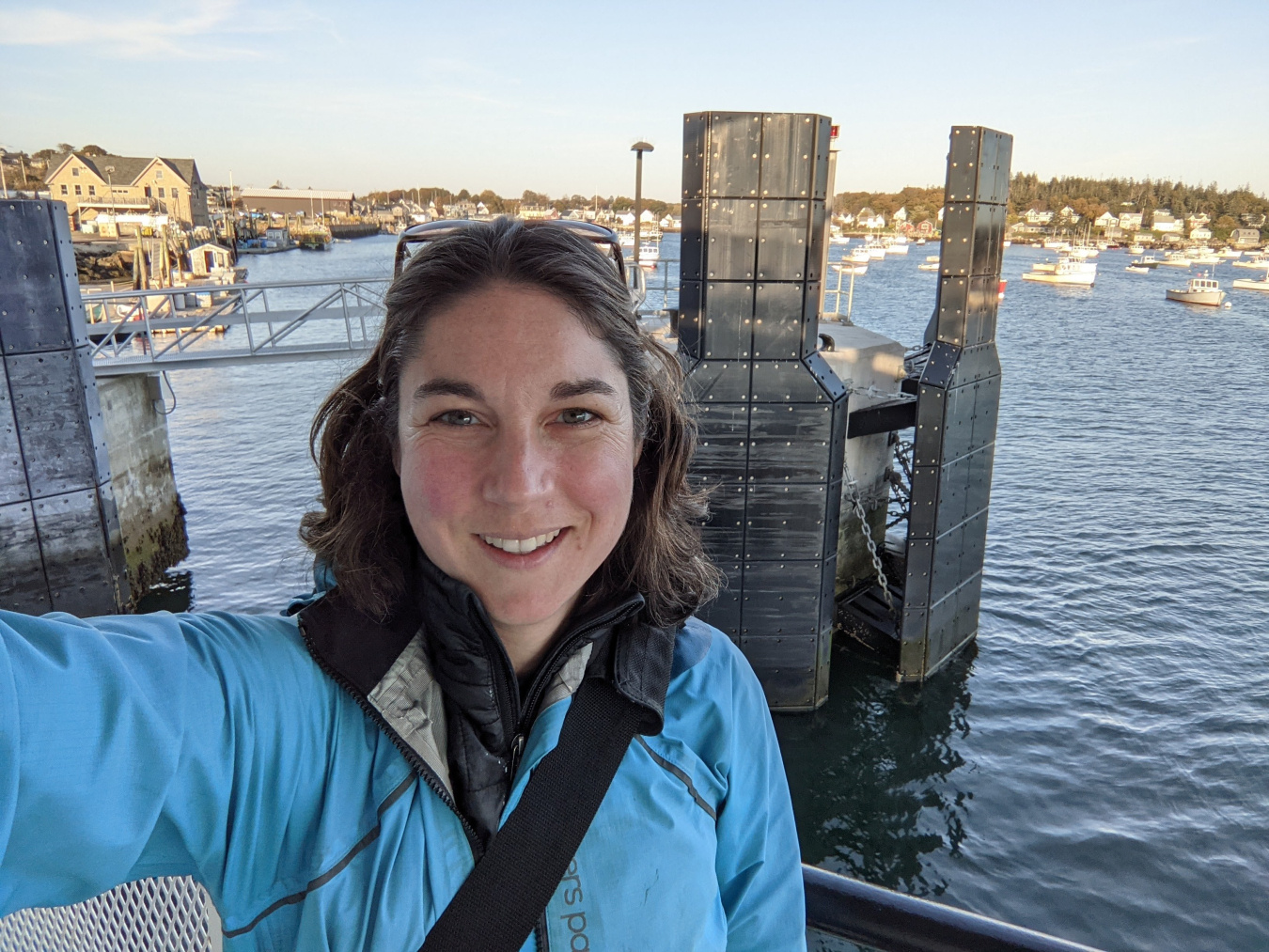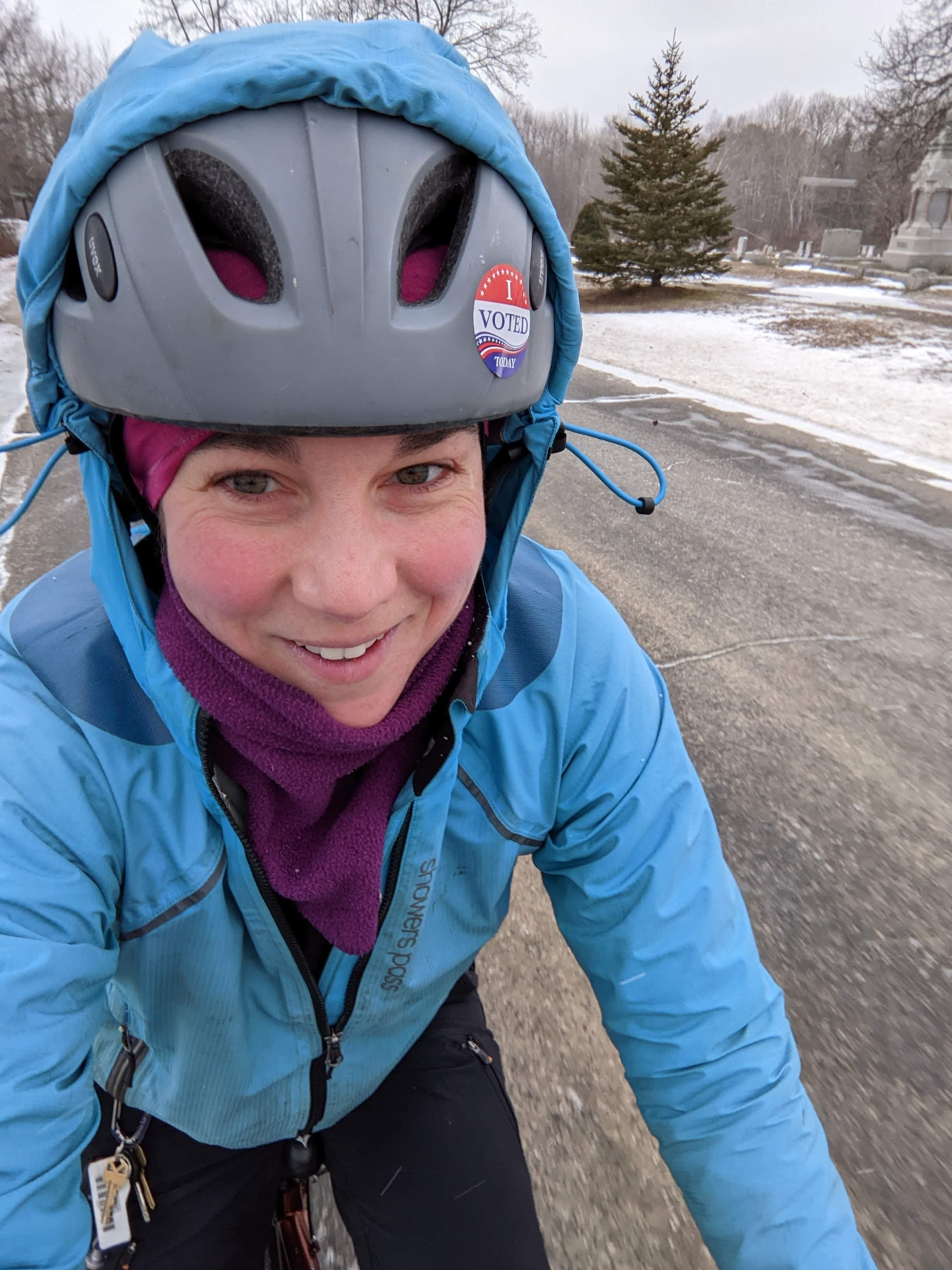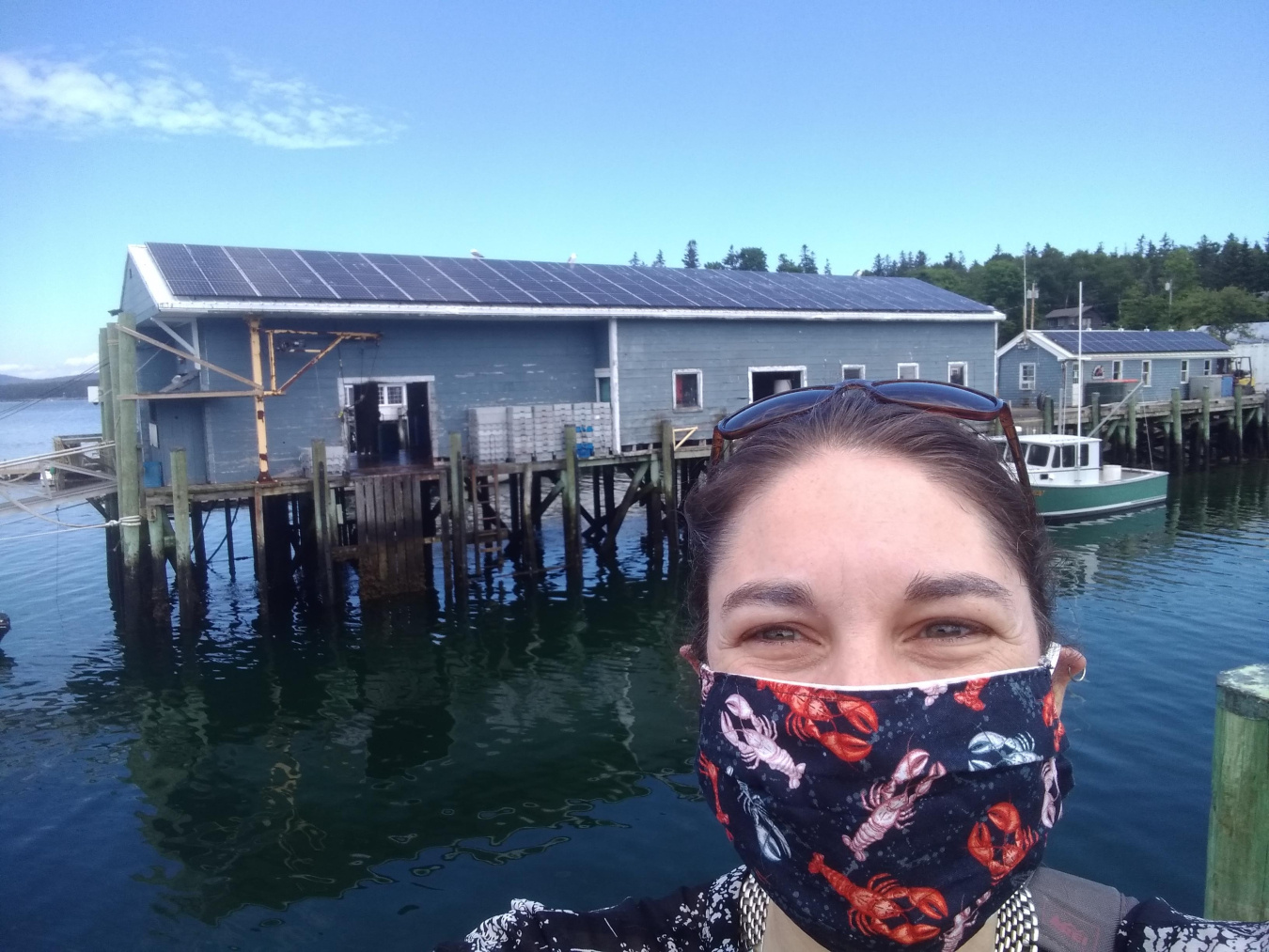Emma Wendt helps Maine's island communities transition to cleaner and more resilient and affordable energy sources often with assistance from the Energy Transitions Initiative Partnership Project.
Water Power Technologies Office
March 23, 2023Growing up in a small, rural fishing community in Nova Scotia, Canada, Emma Wendt was consumed with the idea of consumption.
During hot, dry summer months, her dad reeled a tape measure down the family’s well to see how many feet of water they had left. Before switching to oil, the family chopped and stacked their own wood to heat their home. And when a part broke on their refrigerator, Wendt and her dad found a perfectly good replacement at the local dump.
“We preserved a lot, which came from a strong immigrant mentality,” Wendt said. “In my grandparents’ generation, there was often a war-era mindset: holding onto objects dearly, which sometimes looks like hoarding but is essentially not wasting anything, including time.”
Time might be the most precious resource for the communities Wendt now works with as a community development officer for Maine’s Island Institute. Many of Maine’s islands are already seeing impacts from climate change. Rising sea levels threaten to cut islands in two. And a rapidly warming ocean is hurting lobsters, shrimp, and groundfish populations, threatening one of Maine’s largest industries: commercial fishing.

Maine’s island communities are already facing significant climate change impacts, including rising sea levels that threaten to split their land in two. That’s one reason why Emma Wendt, the community development officer for Maine’s Island Institute, helps these communities transition to cleaner and more resilient and affordable energy sources.
Ripple Effect
WPTO’s Ripple Effect series features individuals whose impactful work will help advance hydropower and marine energy technologies to achieve a clean energy future.
Because of this, many of the state’s remote and island communities are interested in transitioning to clean energy—and not just because climate change threatens their land and livelihoods. It often can be more affordable and create well-paying jobs, too. However, even if communities know what they want, they might not have the tools or funds to get there.
That’s where Wendt, and the Island Institute, come in. She works directly with these island communities—often with assistance from the U.S. Department of Energy’s (DOE) Energy Transitions Initiative Partnership Project (ETIPP), which is supported, in part, by the Water Power Technologies Office. ETIPP helps remote and island communities transition to cleaner and more resilient and affordable energy sources.
Wendt shared how she’s helping an oyster farmer transition to renewable energy and why she sees water power as an important part of the clean energy puzzle.
Apart from being so deeply aware of your family’s consumption of resources, were there any other formative moments that nudged you toward a career in sustainability and clean energy?
In middle school, I learned about the greenhouse effect for the first time. I made the connection between meat consumption, cutting down rainforests in Brazil, and deforestation’s considerable environmental impact. I became a vegetarian when I was 13, primarily for environmental impact reasons. There are many people who come to this work from a conservation ethic or tree-hugging perspective, which I say lovingly. For me, it was primarily about being mindful of the resources we use and where they come from.
You came to the United States to attend college. Did that solidify your interest in sustainability?
When I got to college, I was decent at math, economics, and chemistry. I ended up choosing a major called environmental science and public policy, which hit the right spot. I became really intrigued with corporate social responsibility and focused my undergraduate thesis on the environmental impact of a ski company. But I realized that, to make real change, I had a few gaps to fill. So, I ended up getting a joint MBA and master’s degree in environment and resources.

Emma Wendt has always been hyperaware of her own consumption, aiming to reduce it as much as possible. Today, she still lives by that creed and enjoys biking for transportation, even in chilly Maine winters.
Did you face any obstacles or doubts along the way?
Having an interdisciplinary perspective on sustainability is absolutely crucial to understand how various systems, like energy and transportation, fit together and to identify solutions. That said, I found it difficult to find places willing to pay for that type of perspective and expertise. I've had to figure out how to articulate my experience in systems thinking and demonstrate that as a crucial role.
It sounds like you're the person who figures out how to put all the decarbonization puzzle pieces together.
Right. For me, it’s not just puzzle pieces. It’s people pieces.
Tell me about those people pieces. How are you working with communities to help them transition to clean energy?
My team works on two big buckets. One is communitywide energy resilience—those are the communities that get support through ETIPP. But we also work with communities that are not ready to apply for a long-term ETIPP partnership, helping them identify and articulate challenges. Some communities know what they want to do. So, they ask, “How the heck do we get a million bucks to build this project we really need to keep us running affordably?”
Could you share an example of a community you’ve been working with recently?
Through ETIPP, the city of Eastport, Maine, is looking at options for affordable, clean backup power during outages. Because the city is the eastern-most city in the United States, it’s at the end of the line, electrically speaking, and has many older and low-income residents, so outages can have a big impact.
Through one ETIPP project, the Maine-based company Ocean Renewable Power Company is planning to install a tidal energy device in Eastport, which has some of the highest tides in the world. The local utility also plans to install a battery, which could be topped up with tidal energy and solar power, to provide backup power.
Through ETIPP, experts from national labs are helping all the partners understand how to make these projects happen, what costs are involved, and how residents can benefit from making their homes more efficient. It’s an exciting project—as are all the others we’re working on. Each community has a different take on their energy needs, and we look to local residents to understand their challenges and what they’d like to do about them.
And the other big bucket?
The other big bucket is transitioning the marine sector off fossil fuels. Recently, I was visiting a small oyster farmer on the Maine coast who wants to install solar power. Her house is right on the water; it’s relatively small. And she has her shed where she sells oysters. And we talked about what it would take to install solar energy and transition her boat to electric power at some point.
I’m telling a lot of stories of what other people are doing, and that's basically my job—to develop an awareness of what others are doing, give people the best information and tools, and make sure the right voices are being heard, so those who need clean energy the most are benefiting the most.

Emma Wendt partners with Maine communities and businesses, like an oyster farmer curious about solar power, to arm them with information and tools and, as Wendt put it, “make sure the right voices are being heard, so those who need clean energy the most are benefiting the most.”
Why is a clean energy transition especially important for Maine?
When I moved to Maine, I had never heard so many people talk about climate change. Every day, people live it. Fishermen are keenly aware of what they’re catching, where, and when. I was at this year’s Maine pond hockey tournament, and it was 40 degrees. They were playing on slush.
One of the ETIPP islands, and many other Maine islands, are seeing sea level rise. Their island would be bifurcated with additional rise; sometimes, it already is. Ferries get cancelled because they can’t dock if it’s the highest of high tides. We have flooding, drought. I never thought anybody in Maine would talk about drought, but farmers have been really hurt by that recently.
These are just some of the reasons it’s so great to work with Maine people on clean energy—to help them lower their energy costs and depend less on fossil fuels, which can be expensive.
What advice do you have for communities embarking on clean energy transitions?
This work can seem daunting and overly technical, and it takes a lot of stamina. And keep telling the story of your challenges and hopes, so you can take advantage of all the resources that are out there to support you now and in the future.
Applications for ETIPP technical assistance are open through May 19, 2023. More information on the application process is available on the National Renewable Energy Laboratory’s website.
Catch up on the Water Power Technologies Office’s (WPTO) other Ripple Effect profiles and the Office of Energy Efficiency and Renewable Energy’s Clean Energy Champions.
And stay in the know with WPTO! Receive the latest information on funding opportunities, events, and other news by subscribing to the Hydro Headlines and Water Column newsletters, as well as the comprehensive Water Wire newsletter.

